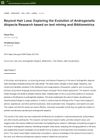January 2025 in “Molecules” Caffeine may help with hair loss, but more research is needed to confirm its effectiveness.
 November 2024 in “International Journal of Molecular Sciences”
November 2024 in “International Journal of Molecular Sciences” Nanoparticles may improve caffeine delivery for hair growth, offering a potential alternative to minoxidil for hair loss treatment.
 October 2024 in “Frontiers in Neurology”
October 2024 in “Frontiers in Neurology” Interventional embolization is effective for treating scalp arteriovenous fistula but can cause complications like swelling and hair loss.
 August 2024 in “Cosmetics”
August 2024 in “Cosmetics” Caffeine is beneficial for skin and hair treatments but needs better delivery methods to penetrate deeper skin layers.
August 2024 in “International Journal of Pharmaceutics” The treatment promotes hair growth, improves hair density, and reduces skin irritation.
 August 2024 in “Veterinary Dermatology”
August 2024 in “Veterinary Dermatology” Topical ceramide treatment partially improves the skin condition in Jack Russell Terriers with a genetic skin disorder.
August 2024 in “International Journal of Biological Macromolecules” New gels using cellulose nanocrystals effectively deliver minoxidil to hair follicles, promoting hair regrowth.
 July 2024 in “Periodontology 2000”
July 2024 in “Periodontology 2000” Autologous platelet concentrates show promise in esthetic treatments but need more standardized research.

Regenerative cosmetics can improve skin and hair by reducing wrinkles, healing wounds, and promoting hair growth.
 July 2024 in “Journal of Education For Sustainable Innovation”
July 2024 in “Journal of Education For Sustainable Innovation” Visualizing data helps guide future androgenetic alopecia research and policies.
 June 2024 in “Majallah-i dānishgāh-i ̒ulum-i pizishkī-i Kirmān.”
June 2024 in “Majallah-i dānishgāh-i ̒ulum-i pizishkī-i Kirmān.” Eucalyptus and Tween 80 most effectively increase cetirizine skin absorption.
 June 2024 in “Indian Dermatology Online Journal”
June 2024 in “Indian Dermatology Online Journal” Topical tofacitinib is effective and safe for treating alopecia areata.
 May 2024 in “Journal of medicinal food”
May 2024 in “Journal of medicinal food” Jojoba oil has many uses beyond skincare, including health benefits and pharmaceutical applications.
April 2024 in “International journal of molecular sciences” Combination pharmacotherapy is generally more effective for treating keloids and hypertrophic scars.
April 2024 in “Surgical Techniques Development” The 11th AICPE Congress in Rimini was a major event in European aesthetic plastic surgery.
 April 2024 in “Skin appendage disorders”
April 2024 in “Skin appendage disorders” Environmental pollutants can damage hair health and cause hair loss.
 April 2024 in “International Journal of Dermatology”
April 2024 in “International Journal of Dermatology” Filler injections can cause temporary hair loss, but hyaluronidase can help restore hair within a few months.
Aesthetic rehabilitation techniques can improve life quality and wellbeing for disabled patients.
 April 2024 in “Nano research”
April 2024 in “Nano research” Minoxidil patches and cold plasma may help treat hair loss.
March 2024 in “Journal of pharmacy & pharmaceutical sciences” Polymeric microneedles offer a less invasive, long-lasting drug delivery method that improves patient compliance and reduces side effects.
 March 2024 in “International journal of nanomedicine”
March 2024 in “International journal of nanomedicine” Polymeric nanohydrogels show potential for skin drug delivery but have concerns like toxicity and regulatory hurdles.
 February 2024 in “ACS Omega”
February 2024 in “ACS Omega” The Shen Bai Hair Growing Decoction may help treat hair loss by promoting hair growth and reducing inflammation.
 February 2024 in “Journal of Robotic Surgery”
February 2024 in “Journal of Robotic Surgery” The document concludes that surgical robots improve surgery and recovery but are costly and can stress surgeons due to less patient contact.
 February 2024 in “Actas Dermo-Sifiliográficas”
February 2024 in “Actas Dermo-Sifiliográficas” Dermatologists recommend oral dutasteride for male hair loss, low-dose oral minoxidil for female hair loss, and a multidisciplinary approach for young patients, with caution during pregnancy.
 January 2024 in “Authorea (Authorea)”
January 2024 in “Authorea (Authorea)” Nanomaterials can significantly improve wound healing and future treatments may include smart, real-time monitoring.
January 2024 in “Cosmetics” Menopause worsens skin, hair, and nails, affecting self-esteem and quality of life.
 January 2024 in “Pharmacy information”
January 2024 in “Pharmacy information” New treatments using stem cells and other methods show promise for promoting hair growth in androgenetic alopecia.
January 2024 in “IFMBE proceedings”  January 2024 in “World Journal of Management Science”
January 2024 in “World Journal of Management Science” Data visualization tools are crucial for understanding and advancing androgenetic alopecia research.
 January 2024 in “Turkiye Klinikleri Journal of Dermatology”
January 2024 in “Turkiye Klinikleri Journal of Dermatology” Microneedling shows promise for hair loss but needs more research.




















